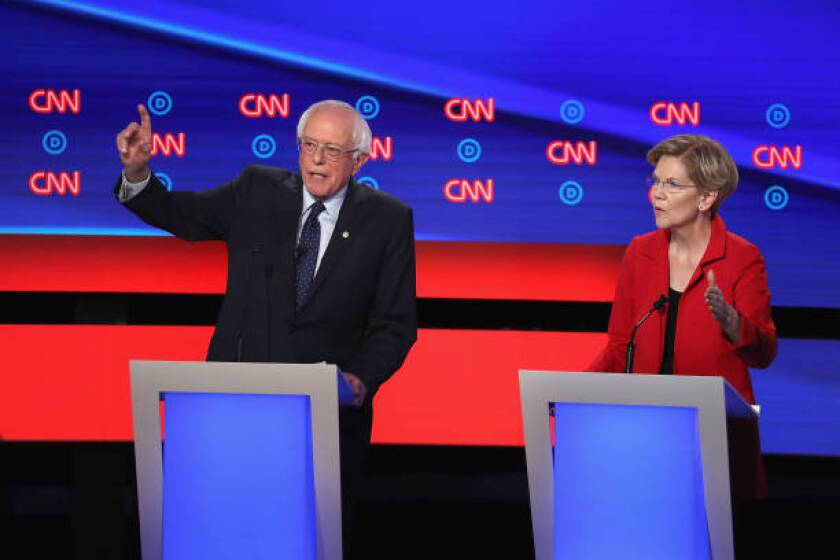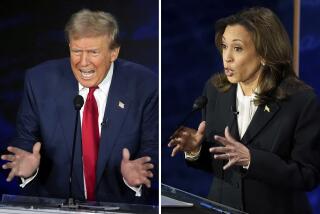Democratic debate: 7 things to watch for on Night 2
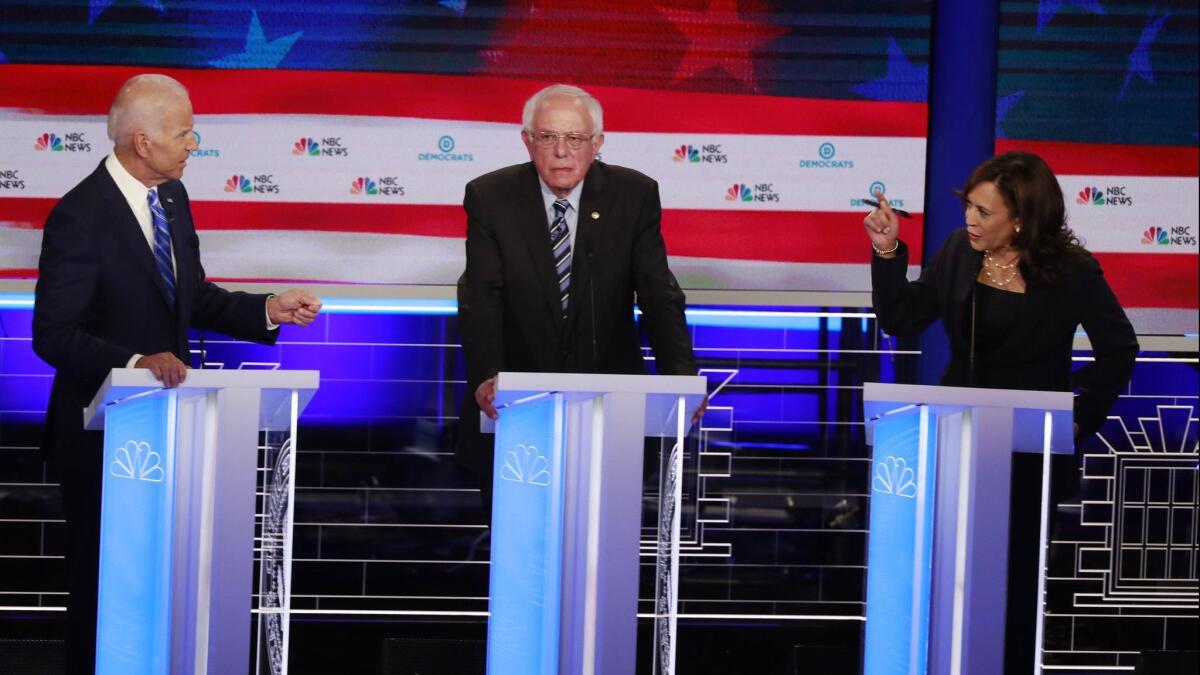
- Share via
Buckle up: It’s time for the second night of the Democratic presidential primary debates in Detroit, which will feature a rematch of former Vice President Joe Biden and Sen. Kamala Harris of California.
Night 1 set off fireworks in Detroit. Will Night 2’s candidates be as feisty? The other candidates on stage will be Colorado Sen. Michael Bennet, New Jersey Sen. Cory Booker, former U.S. Housing Secretary Julián Castro, New York Mayor Bill de Blasio, Hawaii Rep. Tulsi Gabbard, New York Sen. Kirsten Gillibrand, Washington Gov. Jay Inslee and entrepreneur Andrew Yang.
The debate will be moderated by CNN’s Dana Bash, Don Lemon and Jake Tapper. The candidates have 60 seconds to respond to moderator questions and 30 seconds for responses and rebuttals.
Democratic debate 2019 live: Kamala Harris and Joe Biden square off on Night 2 in Detroit
Here’s what to watch for.
1. Kamala Harris caught Joe Biden flat-footed in the last debate. Does Biden punch back this time?
There are downsides to being a front-runner: Biden’s early dominance in the polls, and his long career in public service, have made him a huge target for other Democratic candidates hoping to siphon away his supporters. Harris demonstrated the clear rewards of that strategy when she attacked Biden over his history opposing certain busing for school desegregation in the 1970s. That led to a major surge in the polls for the California senator, whose support had been gradually declining since March.
Biden seemed blindsided by Harris’ clearly prepared attack in the June debate. But lately, the former vice president has become feistier in fighting off his fellow candidates’ jabs on the trail — sparring with Bernie Sanders over the independent Vermont senator’s “Medicare for all” proposal, and criticizing Booker’s criminal justice record as the mayor of Newark.
Biden would be a fool not to expect more direct attacks at this debate. The question is whether he’ll use his debate time to go negative against fellow Democrats.
Democrats clash on climate policy, immigration and healthcare as dark-horse candidates use the debate to battle over the direction of the party.
2. Is Booker giving up on “love” to try to get ahead?
To be clear, Booker’s love life appears to be going just fine. (He has been dating actress Rosario Dawson for a while.) But on the trail, where he had launched a campaign based on a message of “love,” Booker has recently been throwing sharper and sharper elbows to try to climb higher than 2% or 3% support in the polls.
Some of those sharper elbows have been directed at President Trump, but some have been pointed Biden’s way, too. “It’s not enough to tell us what you’re going to do for our communities, show us what you’ve done for the last 40 years,” Booker tweeted about Biden’s support for the 1994 crime bill. “You created this system. We’ll dismantle it.” Booker, speaking to reporters, also called Biden “an architect of mass incarceration.”
The attacks have been sharp enough to draw the front-runner’s attention. “His police department was stopping and frisking people, mostly African American men,” Biden said of Booker’s time as mayor of Newark. “If he wants to go back and talk about records, I’m happy to do that. But I’d rather talk about the future.”
Does love win? Maybe not. If Booker is going negative to get himself noticed, it’s working.
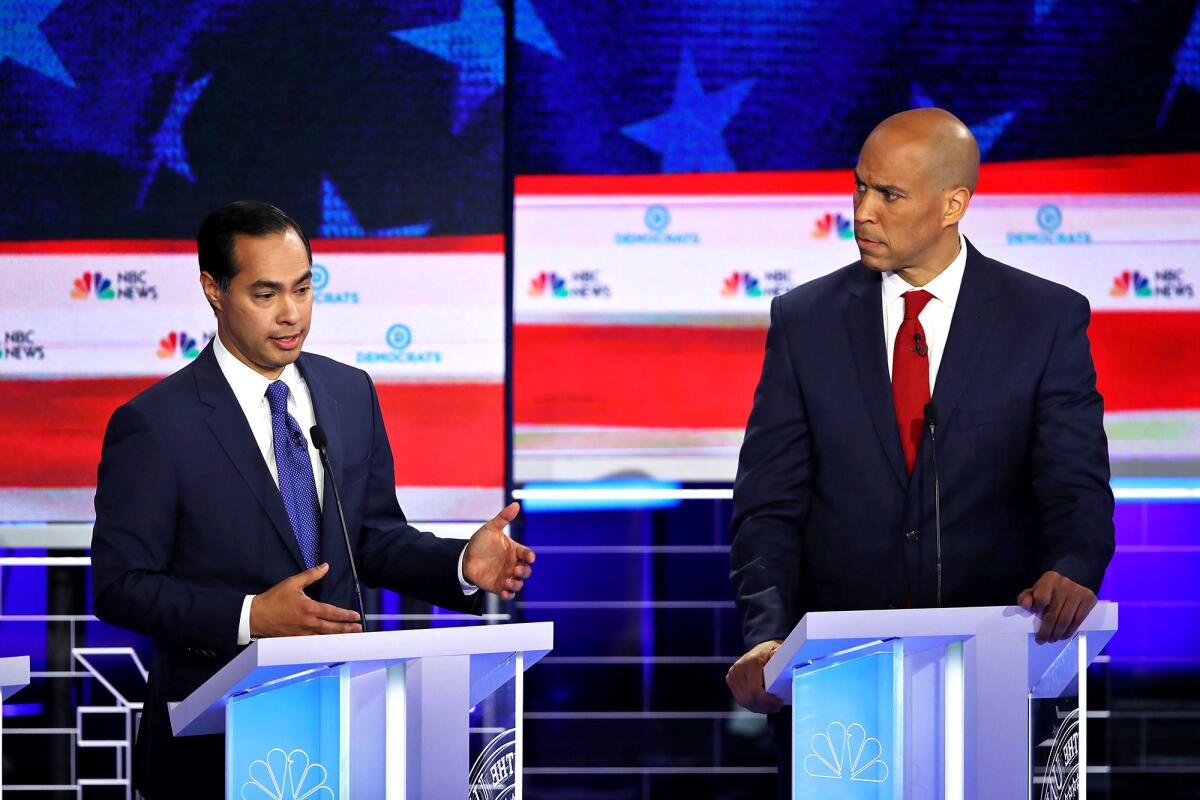
3. Julián Castro did well in the last debate. If he turns in another good performance, will it mean anything?
If Harris is the shining example of the life-saving energy that a strong debate performance can jolt into a drifting campaign, Castro is the counterweight: Pundits agreed that he was one of the breakout candidates of the first debate, and yet Castro’s average poll numbers have barely budged above 1% in the month since then.
The televised debates are the presidential campaign’s biggest stage, with the promise of millions of viewers for the candidates who meet the qualifications. It’s why campaigns are dumping money into Facebook ads to persuade donors to chip in $1 — to make sure they’re eligible to get on TV.
But Castro’s last performance is a warning that it’s not enough simply to do well on the debate stage.
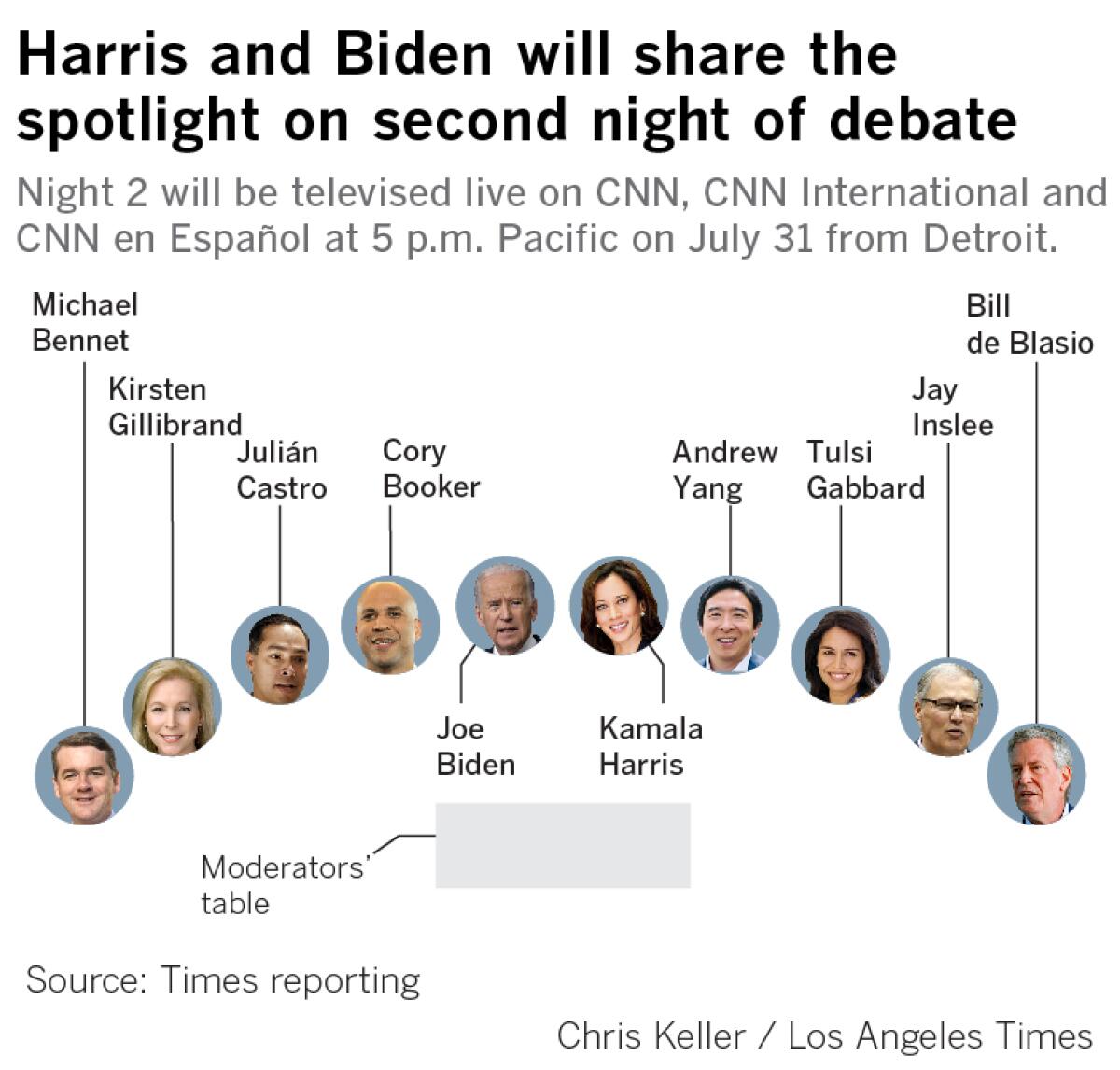
4. Wednesday night’s debate could be a last hurrah for some of these low-polling candidates unless they shake things up.
It’s humbling to run for president. You might win election after election after election to be the kind of politician who becomes a U.S. senator or governor, only to then reach one rung higher for the White House — and totally face-plant.
After months of campaigning, some big names in the Democratic Party who are on Wednesday night’s debate stage — Bennet, Castro, De Blasio, Gabbard, Gillibrand and Inslee — are stuck pretty close to the 1% polling mark, which means that they could be at risk of not qualifying for the next televised debate in September. To get there, the candidates have to hit 2% in four polls, in addition to accumulating 130,000 donors. So far, Biden, Harris, Sanders, South Bend, Ind., Mayor Pete Buttigieg, former Texas Rep. Beto O’Rourke and Massachusetts Sen. Elizabeth Warren have qualified; Castro and Yang have met the donor requirement but not the poll requirement.
So for those bottom-tier candidates, you might wonder what they’d be willing to try in front of a national audience to get a boost.
5. Healthcare, healthcare, healthcare.
One of the biggest policy stories of this election is the Democratic candidates’ leftward lurch on health insurance, propelled primarily by the continued rise of private insurance costs and Sanders’ popularization of the idea of “Medicare for all.”
But Medicare for all, like beauty, is in the eye of the beholder: In Sanders’ view, government-run health insurance should replace private insurance entirely, which would be a revolutionary shift in the way the U.S. regulates healthcare. And that’s a little too revolutionary in the eyes of several of Sanders’ opponents, including Wednesday night’s two top-polling candidates. During the first night of the Detroit debate, candidates spent plenty of their precious minutes arguing healthcare.
In the Democratic debate in Detroit, progressive candidates Elizabeth Warren and Bernie Sanders fend off attacks from centrists.
On center stage Wednesday night, Biden would prefer a Medicare-like public option for health insurance, and he recently warned that union members with strong private insurance plans won’t like being asked to give them up under a Sanders plan. Harris’ plan, released Monday, carries the name “Medicare for all” but, like Biden’s proposal, would not eliminate private insurance. The pair might try to drive Democratic voters away from Sanders and Warren by casting the elimination of private insurance as too extreme.
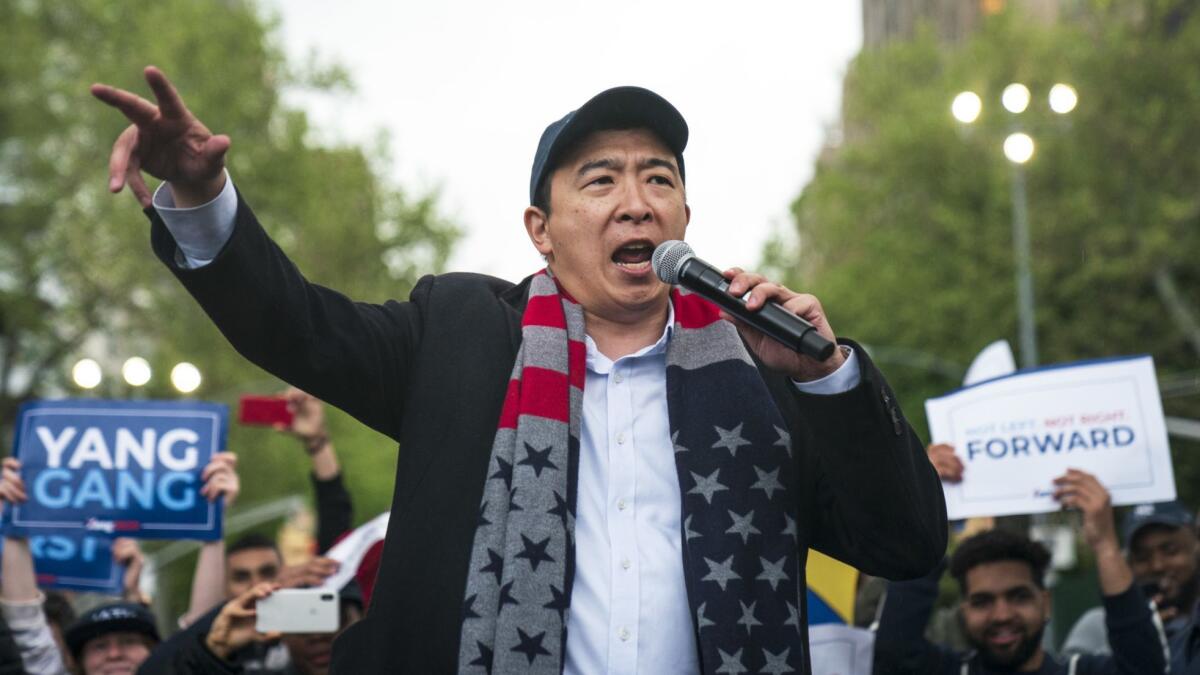
6. What’s up with Andrew Yang?
Yang, an outsider candidate whose platform centers around a $12,000-a-year universal basic income plan for all Americans, has been one of the biggest surprises of this cycle. He has no elected political experience, and very few Democrats knew who he was before he launched his quixotic, ironic and internet-savvy 2020 campaign. And yet he consistently draws decently sized crowds on the campaign trail and often polls around 2%, which is higher than several U.S. senators and governors in the race can claim.
But during his grand debut on the national stage in last month’s first Democratic debate, Yang tanked. He got by far the least speaking time — a little less than three minutes — of any of the 20 candidates, and he didn’t do much with the time he got. (Biden got the most time, with more than 13 minutes.) “If I only get three minutes of talking time in the next debate I’m still using all of them to attack Michael Bennet,” Yang joked on Twitter of the congenitally mild Colorado senator.
Yet Yang will continue to matter because, due to his polling and donor numbers, he is on the verge of qualifying for the September debate when several other Democrats won’t. So even if he whiffs again in Detroit, he could very likely get a third shot at telling his unique story about how he thinks automation is about to devastate American employment.
7. Will anyone bother bringing up the I-word?
The case for impeaching Trump has slowly but surely been building steam in the Democratic-controlled U.S. House of Representatives. Members of Congress have variously accused the president of corruption, sexism, racism and abetting Russian influence in his 2016 election. But out on the campaign trail, the Democratic candidates, while freely criticizing the president in similarly harsh terms, do not spend much of their energy making the case for impeachment and using their bully pulpit to persuade hesitant members of Congress.
Democrats debating in Detroit decried President Trump’s racist statements and outlined how they would combat emboldened white supremacists.
There’s perhaps some logic to that: Winning the presidential election would bring the same result — the removal of Trump from office — as a successful impeachment, and it’s arguably a lot easier. You only need a majority of electoral votes to become president. But you need two-thirds of the nation’s senators to approve the president’s removal from office, which seems unlikely, given the current Republican majority in the Senate and Trump’s popularity inside the GOP.
But one of the ironies of the 2020 campaign is the gap between how the Democratic candidates and Democratic voters talk about the election. On the trail, most candidates have spent a great deal of time talking about their policy visions for healthcare, climate change and several other sweeping issues. Meanwhile, voters care about the nuances of policy and they have their favorites in the race, but when it boils down to it, many of them will say they’re happy to support whichever Democrat will defeat Trump. It’s not the same thing as impeachment, but it’s not far off, either.
More to Read
Get the L.A. Times Politics newsletter
Deeply reported insights into legislation, politics and policy from Sacramento, Washington and beyond. In your inbox twice per week.
You may occasionally receive promotional content from the Los Angeles Times.
